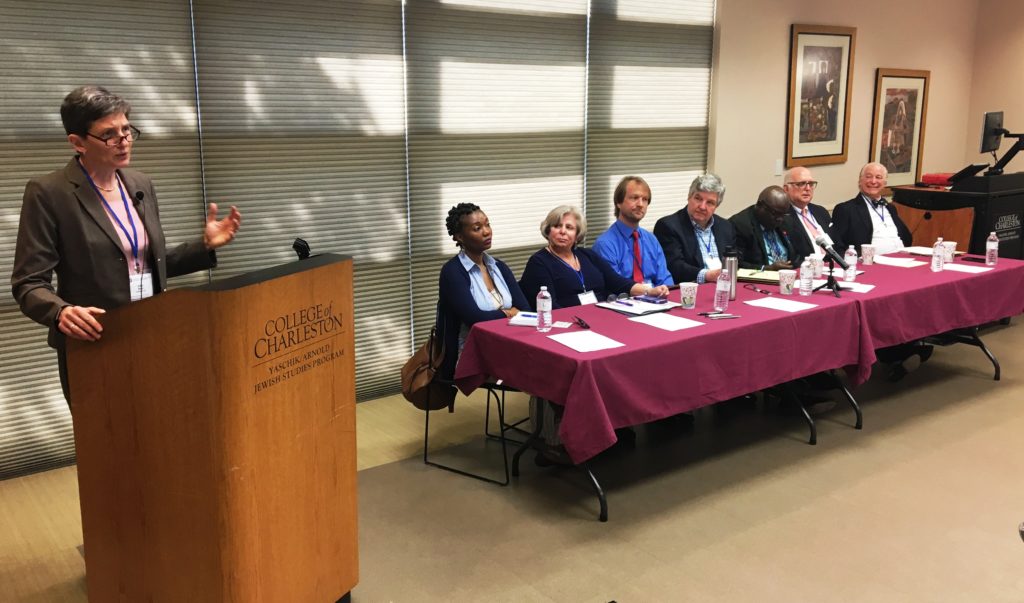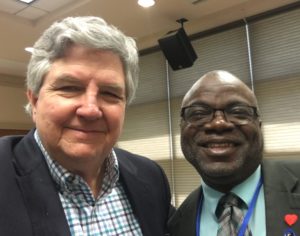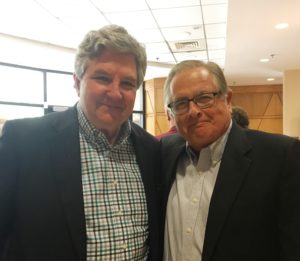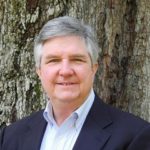Jewish Historical Society of South Carolina (JHSSC)
Spring 2018 Meeting – Charleston, SC, April 28-29th
Monuments. memorials, and historical memory have been much in the news over the last year. In Charlottesville in August 2017, white supremacists rallied to oppose the removal of a statue of Robert E. Lee, The tiki-torch-brandishing crowd paraded through the city chanting, “You will not replace us: Jews will not replace us.” These slogans chillingly alerted Jews and African American alike that neo-Nazi ideology is once again targeting anyone not considered “white.”
With these common histories of racial victimization, Jews and African Americans share an urgent need to confront this resurgence. The JHSSC partners with The College of Charleston’s Program in the Carolina Lowcountry and Atlantic World (CLAW), African American Studies Program, and the Charleston branch of the Association for the Study of African American Life & History, for the spring conference in Charleston focused on the history of minority exclusion and white supremacy in South Carolina, the monuments that enshrine public memory, and the ethics of cultural tourism.
—Excerpt from the JHSSC Spring 2018 Program
April 29th – Difficult History: Plantations, Concentration Camps, and Cultural Tourism
This was an excellent conference, and I enjoyed participating in it. Our session featured thoughtful presentations by each colleague and informative discussions with the audience. We really need to have more sessions like this, dealing with “difficult histories.” It helps all of us who care about such issues—recognizing that we’re not alone, we can learn from and encourage one another. Also, this should not be a one-time program nor one site or organization doing it—we need to keep sharing our experiences with our colleagues so this can become a bigger, broader effort that can lead to meaningful change.
The starting point, as it always is with such challenges, is with yourself. What are you prepared to do? Why do you want to address difficult issues in history? Can you come up with answers that spring from both your intellect and your heart? Because both are necessary.
How prepared is your organization? Can support of such an initiative be interwoven throughout its leadership, the board, executive staff, communications, marketing, and development? Because that’s what it will take.
Is your site open to driving a new interpretation across the house, landscape, collections, and adult and student programs, and retail—and not just through tours? A more comprehensive, more holistic interpretation also needs to extend far beyond the site or organization itself, and to the website, social media channels, and all forms of communication reaching both internal and external stakeholders. Do you have the qualified staff to make all of this happen?
Is your organization prepared to form alliances with other individuals and institutions? This could mean different races, ethnic and immigrant groups, and those of different backgrounds and points of view. For example, when I was the executive director at Drayton Hall, we made sure that there were descendants of both the Draytons and the Bowens families on the board of directors.
This may sound overwhelming, but don’t let it prevent you from taking a first step. One simple yet effective way of interpreting African American history in tourism programs at plantation sites is to change the use of passive verbs into active verbs. It’s not “the house was built”, but “the enslaved built the house.” Even more meaningful, if your site is fortunate to have historical names to assign to these actions, is to describe: “Tom, the gardener, cultivated the fields” or “Sara, the cook, prepared the afternoon meal.” In answering that question of “who”, you bring real people into the interpretation, and your programs come alive.
I also recommend the concept of “proximate” learning from Bryan Stephenson’s book “Just Mercy: A Story of Justice and Redemption”. What he means is that we learn by being in close proximity with other people, especially those who may be different from us. We shape them and they shape us, and we have a better understanding of the human condition. By dealing with “difficult history,” we can step outside our bubble of comfort—a bubble that we all have—and get to know one another as human beings.

Robin Waites, Executive Director, Historic Columbia, far left, moderated “Difficult History: Plantations, Concentration Camps, and Cultural Tourism”
Panelists, left to right, generated a healthy discussion:
Sara Daise, Cultural History Interpreter, shared her experience interpreting African American slavery at McCleod Plantation and offered insights into both her professional observations and personal feelings.
Lilly Filler, Chair, SC Holocaust Council and JHSSC Vice President, described the dearth of education about the Holocaust in current state standards and the efforts by her and others to ameliorate that situation. She also urged the audiences to support such efforts and gave examples of effective programs.
Shawn Halifax, Cultural History Interpretation Coordinator for Charleston County Parks, based at McLeod Plantation, also combined his professional and personal reflections on interpreting slavery at McLeod Plantation, and underscored the importance of leadership in undertaking “difficult history”—he described how interpretation affected the guides themselves and why support from the organization’s leadership is crucial.
George McDaniel, Executive Director Emeritus, Drayton Hall, and President, McDaniel Consulting
Joe McGill, founder of The Slave Dwelling Project, used his work with the Southern Regional Office of the National Trust for Historic Preservation to describe his pioneering endeavor, The Slave Dwelling Project, and what people have learned as he’s taken it not only across the south, but into the mid-Atlantic, mid-west, and New England regions.
David Popowski, Attorney and member of the Charleston Holocaust Council, urged the audience to support education of the Holocaust and shared his personal insights into why it’s important.
Robert Rosen, Attorney, author of The Jewish Confederates, and JHSSC Past President, presented his views about Confederate Memorials and how they can be used for education purposes rather than be torn down.
The benefit of these diverse points-of-view was that the audience could see how “difficult history” could be approached in a variety of ways and how important it is that we all seek to tell this more complete story of our past.
Your thoughts would be welcome in the comments below.

With Joe McGill, founder of The Slave Dwelling Project whose mission is “to identify and assist property owners, government agencies and organizations to preserve extant slave dwellings.”

With Robert R. Macdonald, executive director emeritus of the Museum of the City of New York, who now resides in Charleston.
Click here to learn more about the Jewish Historial Society of South Carolina.
 George W. McDaniel, Ph.D., is President of McDaniel Consulting, LLC, a strategy firm that helps organizations use history to build bridges within itself and to its broader constituents. The company’s tag line, “Building Bridges through History,” is grounded in McDaniel’s personal beliefs and his experience in site management, preservation, education, board development, fundraising, and community outreach. Rather than using history to divide us, he strives to help organizations use history, especially local history, to enhance cross-cultural understanding and to support local museums, preservation, and education. Dr. McDaniel recently led volunteer efforts with Emanuel AME Church and historical organizations in Charleston to use historic preservation to enhance racial reconciliation and healing. McDaniel is also the Executive Director Emeritus of Drayton Hall, a historic site in Charleston, SC, owned by the National Trust for Historic Preservation. He retired from Drayton Hall in 2015 after 25 years of distinguished service.
George W. McDaniel, Ph.D., is President of McDaniel Consulting, LLC, a strategy firm that helps organizations use history to build bridges within itself and to its broader constituents. The company’s tag line, “Building Bridges through History,” is grounded in McDaniel’s personal beliefs and his experience in site management, preservation, education, board development, fundraising, and community outreach. Rather than using history to divide us, he strives to help organizations use history, especially local history, to enhance cross-cultural understanding and to support local museums, preservation, and education. Dr. McDaniel recently led volunteer efforts with Emanuel AME Church and historical organizations in Charleston to use historic preservation to enhance racial reconciliation and healing. McDaniel is also the Executive Director Emeritus of Drayton Hall, a historic site in Charleston, SC, owned by the National Trust for Historic Preservation. He retired from Drayton Hall in 2015 after 25 years of distinguished service.
A frequent writer, speaker, and facilitator about such issues, he can be reached at gmcdaniel4444@gmail.com or through his website at www.mcdanielconsulting.net.
Header Image: The Jewish Historical Society of South Carolina logo – http://jhssc.org/

 McDaniel Consulting LLC is a strategy firm that helps organizations use history to build bridges within itself and its broader constituents.
McDaniel Consulting LLC is a strategy firm that helps organizations use history to build bridges within itself and its broader constituents.